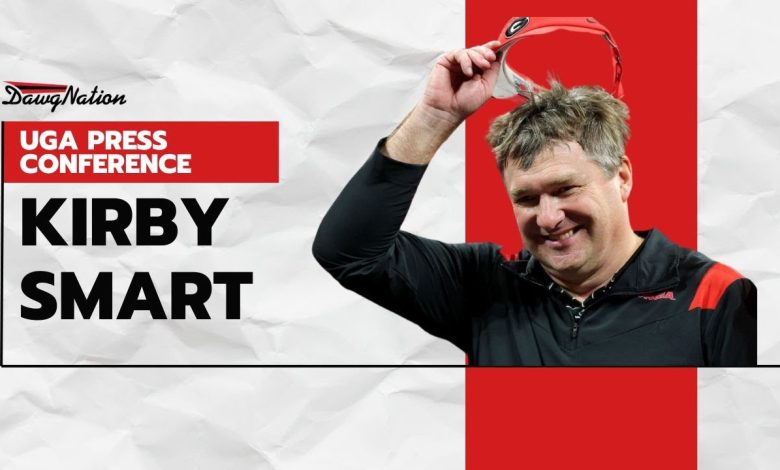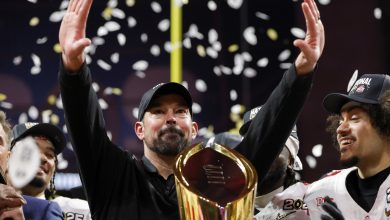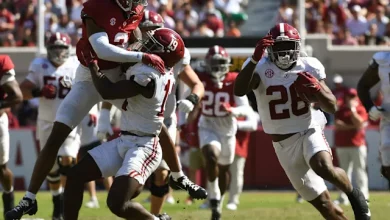Georgia Bulldogs head coach Kirby Smart commented on Tennessee quarterback Nico Iamaleava’s decision to enter the transfer portal.

In a college football landscape increasingly shaped by the transfer portal, NIL deals, and player mobility, one of the sport’s biggest names has officially weighed in on a major development. Georgia head coach Kirby Smart offered a candid take on Tennessee quarterback Nico Iamaleava’s decision to enter the transfer portal—a move that sent shockwaves through the SEC and across the national college football scene.
Smart’s comments came during Georgia’s spring media availability, where the two-time national championship-winning coach addressed the growing volatility surrounding roster management and quarterback development.
Iamaleava’s Portal Entry: A Surprise Shake-Up
Nico Iamaleava, the former five-star quarterback out of California’s Warren High School, was once viewed as the crown jewel of Tennessee’s recruiting efforts. Rated the No. 2 overall player in the 2023 class by 247Sports, Iamaleava’s commitment symbolized a new era for the Vols under head coach Josh Heupel—a potential heir to Hendon Hooker and Joe Milton in the up-tempo, high-powered Tennessee offense.
After redshirting in 2023, Iamaleava was expected to take full control of the Vols’ offense in 2024. He even dazzled in Tennessee’s Citrus Bowl win over Iowa, showing flashes of elite arm talent and poise in his first career start. But in a stunning twist, Iamaleava entered his name into the NCAA transfer portal just one week into spring practice.
The announcement triggered immediate speculation—was it about NIL? Was he unhappy with the offensive direction? Or was it simply a matter of fit? Whatever the reason, the ripple effects extended beyond Knoxville.
Kirby Smart: “That’s the World We Live In”
When asked about Iamaleava’s decision, Smart offered a mix of realism and reflection. While he didn’t directly criticize the young quarterback, the Georgia head coach used the situation as a springboard to discuss larger issues facing the sport.
“I’m not surprised anymore,” Smart said. “When a player like that, a guy with so much upside and promise, decides to leave a place where he was supposed to be the future—it tells you everything you need to know about how quickly things can change now.”
Smart emphasized that the transfer portal has essentially made every offseason an open market for quarterbacks, even those once considered foundational pieces of a program.
“Quarterbacks are different,” Smart explained. “They touch the ball every play. If they’re not starting, or they’re not in a system they believe showcases them, they move on. That’s not always a bad thing. But when a guy like Nico leaves before he even has a full season under his belt, it shows the pressure these kids are under.”
The Georgia Lens: Stability vs. Mobility
At Georgia, Smart has managed to buck the trend of quarterback instability, at least in recent years. After a carousel of passers in his early tenure, including Jacob Eason, Jake Fromm, and Justin Fields—all involved in transfers—Smart eventually found a steady hand in Stetson Bennett, whose journey from walk-on to national champion became legend.
Now, with Carson Beck entering his second season as the starting quarterback, Georgia has rare continuity at the position. That’s not lost on Smart, who pointed to the Bulldogs’ development model as a key differentiator.
“We’ve worked hard to create a program where development matters,” he said. “We’re not going to guarantee a guy anything, but if he stays and works, he’ll get his shot.”
That philosophy contrasts with the increasingly transactional nature of quarterback recruitment across the country—where NIL packages, instant playing time, and personal branding often eclipse long-term development.
“Look, we’re recruiting five-stars like everyone else,” Smart continued. “But we’re not promising them they’ll start as freshmen. If they’re good enough, they’ll earn it. If not, they’ve got to wait. Some guys don’t want to wait.”
Nico’s Decision: A Cautionary Tale or a Smart Move?
While some observers see Iamaleava’s transfer as a red flag—perhaps suggesting discomfort or dissatisfaction within Tennessee’s program—others argue it reflects a quarterback taking control of his career path.
“I don’t know what all went into his decision,” Smart said, “and I’m not going to pretend to. But I do know this: no one outside that locker room really understands what a quarterback goes through. Pressure from fans, media, teammates—it’s real. And when you throw NIL into the mix, it’s a lot for a 19-year-old.”
Smart was careful not to criticize Iamaleava personally but did suggest that players are often reacting to situations that could be better handled with patience and support.
“There used to be value in sitting, in learning,” Smart said. “Some of the best quarterbacks I’ve coached weren’t ready year one. But now, you’ve got one spring, one bowl game, and if it doesn’t feel right, you’re gone.”
SEC Implications: A Power Shift?
Iamaleava’s exit is more than a Tennessee story—it potentially alters the balance of power in the SEC East and beyond. With Georgia again projected as a title contender, Tennessee’s quarterback uncertainty could widen the gap between the Bulldogs and the rest of the division.
“You hate to see a young guy leave because it’s tough on the program,” Smart admitted. “But that’s part of the game now. We have to adapt. We have to keep recruiting, developing, and building depth, because you never know who’s staying.”
That adaptability has become a hallmark of Smart’s tenure. With back-to-back national titles in 2021 and 2022, and a playoff appearance in 2023, Georgia has remained elite while other programs deal with attrition and instability.
“The way things are trending,” Smart said, “you almost have to re-recruit your roster every year. That’s just the reality. Guys want to play. If they don’t, they leave.”
A Message to Young Quarterbacks
When asked what advice he would give to a young quarterback contemplating the portal, Smart didn’t hesitate.
“Know your why,” he said. “If you’re transferring because you see a better opportunity and you’ve done everything you can at your current place, that’s one thing. But if you’re leaving because it’s hard, or because it’s not happening fast enough, you need to take a step back.”
Smart acknowledged the difficulty of the situation but urged players to trust the process.
“Some of the best careers I’ve seen started with setbacks,” he said. “Stetson [Bennett] was counted out more times than I can remember. But he stuck with it. He believed in himself and in our program. That’s what we want here at Georgia.”
What’s Next for Nico?
While Iamaleava’s next destination remains unknown, several high-profile programs are expected to pursue him. Given his talent and pedigree, he’ll likely have no shortage of suitors.
Smart wouldn’t speculate on where Iamaleava might land but acknowledged the broader impact of elite quarterbacks switching schools.
“Anytime a guy like that hits the portal, the phones light up,” Smart said. “Everybody’s watching. Everybody wants a difference-maker. It’s just how the game works now.”
Final Thoughts: The Portal Era Rolls On
Kirby Smart’s response to Nico Iamaleava’s transfer portal move wasn’t incendiary or sensational—it was thoughtful, measured, and rooted in the current reality of college football. While Smart didn’t celebrate the move, he didn’t condemn it either. Instead, he used it to highlight the challenges facing both players and coaches in this era of unprecedented mobility.
“This isn’t the same game I played or even started coaching in,” Smart concluded. “But it’s still about relationships. It’s still about trust. And it’s still about finding the right fit—for players and programs. If we can keep that at the center, we’ll be alright.”
For Georgia, that philosophy has paid off in championships. For Tennessee, Iamaleava’s exit represents both a setback and an opportunity. And for the rest of college football, it’s another reminder that in the transfer portal era, change is always just a click away.









